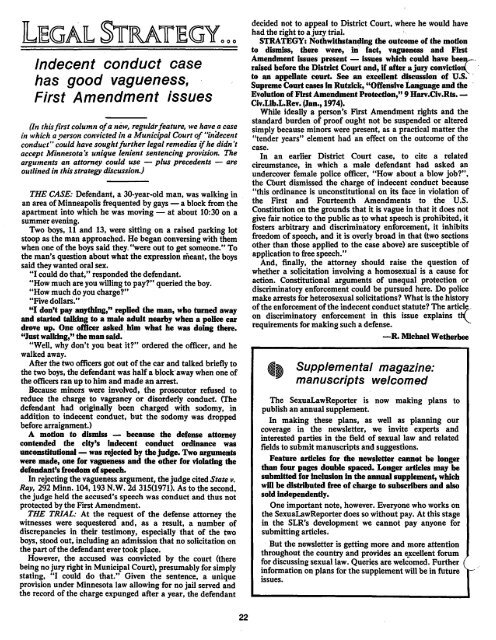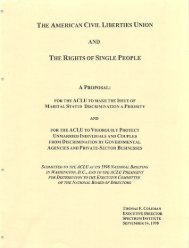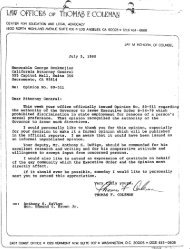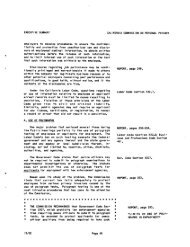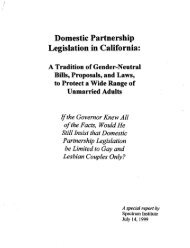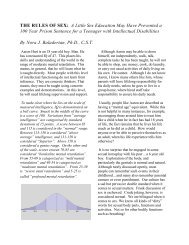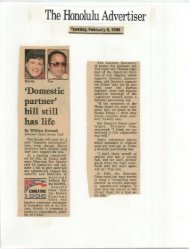1975 - Unmarried America
1975 - Unmarried America
1975 - Unmarried America
Create successful ePaper yourself
Turn your PDF publications into a flip-book with our unique Google optimized e-Paper software.
lECGAl §TRATJECGYooo<br />
Indecent conduct case<br />
has good vagueness,<br />
First Amendment issues<br />
(In this first column of a new, regular feature, we have a case<br />
in which a ."erson convicted in a Municipal Court of"inaecent<br />
conduct" could have sought further legal remedies if he didn't<br />
accept Minnesota's unique lenient sentencing provision. The<br />
arguments an attorney could use - plus precedents - are<br />
outlined in this strategy discussion.)<br />
THE CASE: Defendant, a 30-year-old man, was walking in<br />
an area of Minneapolis frequented by gays - a block from the<br />
apartment into which he was moving - at about 10:30 on a<br />
summer evening.<br />
Two boys, 11 and 13, were sitting on a raised parking lot<br />
stoop as the man approached. He began conversing with them<br />
when one of the boys said they, "were out to get someone." To<br />
the man's question about what the expression meant, the boys<br />
said they wanted oral sex.<br />
"I could do that," responded the defendant.<br />
"How much are you willing to pay" queried the boy.<br />
"How much do you charge"<br />
"Five dollars."<br />
"I don't pay anything," repUed the man, who turned away<br />
and started taIldng to a male adult nearby when a poUce ear<br />
drove up. One officer asked. him what he was doing there.<br />
"Just walking," the man said.<br />
"Well, why don't you beat it" ordered the officer, and he<br />
walked away.<br />
After the two officers got out of the car and talked briefly to<br />
the two boys, the defendant was half a block' away when one of<br />
the officers ran up to him and made an arrest.<br />
Because minors were involved, the prosecutor refused to<br />
reduce the charge to. vagrancy or disorderly conduct. (The<br />
defendant had originally been charged with sodomy in<br />
addition to indecent conduct, but the sodomy was dropped<br />
before arraignment.)<br />
A motion to dismiss - because the defense attorney<br />
contended the city's Indecent conduct ordinance was<br />
unconsdtutional- was rejected by the judge. Two arguments<br />
were made, one for vagueness and the other for violating the<br />
defendant's freedom of speech.<br />
In rejecting the vagueness argument, the judge cited State v.<br />
Ray, 292 Minn. 104,193 N.W. 2d 315(1971). As to the second<br />
the judge held the accused's speech was conduct and thus not<br />
protected by the First Amendment.<br />
. THE TRIAL: At the request of the defense attorney the<br />
wItnesses were sequestered and, as a result, a number of<br />
discrepancies in their testimony, especially that of the two<br />
boys, stood out, including an admission that no solicitation on<br />
the part of the defendant ever took place.<br />
However, the accused was convicted by the court (there<br />
being no jury right in Municipal Court), presumably for simply<br />
stati~, "I could .do that." Given .the sentence, a unique<br />
prOVISIon under Mmnesota law allowmg for no jail served and<br />
the record of the charge expunged after a year, the defendant<br />
decided not to appeal to District Court, where he would have<br />
had the right to a jury trial.<br />
STRATEGY: Nothwithstanding the outcome of the motion<br />
to dismiss, there were, in" fact, vagueness and First<br />
Amendment issues present - issues which coUld have bee,-.<br />
raised before the District Court and, if after a jury convictio~ .<br />
to an appellate court •. See an excellent discussion of U.S.·<br />
Supreme Court cases In Rutzick, "Offertsive Language and the<br />
Evolution of First Amendment Protection," 9 Harv.Civ.Rts. -<br />
Civ.Lib.L.Rev. (Jan., 1974).<br />
While ideally a person's First Amendment rights and the<br />
standard burden of proof ought not be suspended or altered<br />
simply because minors were present, as a practical matter the<br />
"tender years" element had an effect on the outcome of the<br />
case.<br />
In an earlier District Court case, to cite a related<br />
circumstance, in which a male defendant had asked an<br />
undercover female police officer, "How about a blow job",<br />
the Cburt dismissed the charge of indecent conduct because<br />
"this ordinance is unconstitutional on its face in violation of<br />
the First and Fourteenth Amendments to the U.S.<br />
Constitution on the grounds that it is vague in that it does not<br />
give fair notice to the public as ~o what speech is prohibited, it<br />
fosters arbitrary and discriminatory enforcement, it inhibits<br />
freedom of speech, and it is overly broad in that (two sections<br />
other than those applied to the case above) are susceptible of<br />
application to free speech."<br />
And, finally, the attorney should raise the question of<br />
whether a solicitation involving a homosexual is a cause for<br />
action. Constitutional arguments of unequal protection or<br />
discriminatory enforcement could be pursued here. Do police<br />
make arrests for heterosexual solidtations What is the history<br />
of the enforcement of the indecent conduct statute The article<br />
on discriminatory enforcement in this issue explains ~<br />
requirements for making such a defense.<br />
-R. Michael Wetherbee<br />
Supplemental magazine:<br />
manuscripts welcomed<br />
The SexuaLawReporter is now making plans to<br />
publish an annual supplement.<br />
In making these plans, as well as planning our<br />
coverage in the newsletter, we invite experts and<br />
interested parties in the field of sexual law and related<br />
fields to submit manuscripts and suggestions.<br />
Feature articles for the newsletter cannot be longer<br />
than four pages double spaced. Longer articles may be<br />
submitted for inclusion in the annual supplement, which<br />
will be distributed free of charge to subscribers and also<br />
sold Independently.<br />
One important note, however. Everyone who works on<br />
the SexuaLawReporter does so without pay. At this stage<br />
in the SLR's development we cannot pay anyone for<br />
submitting articles.<br />
But the newsletter is g~tting more and more attention<br />
throughout the country and provides an eJCcellent forum<br />
for discussing sexual law . Queries are welcomed. Further<br />
information on plans for the supplement will be in future<br />
issues.<br />
r-<br />
22


